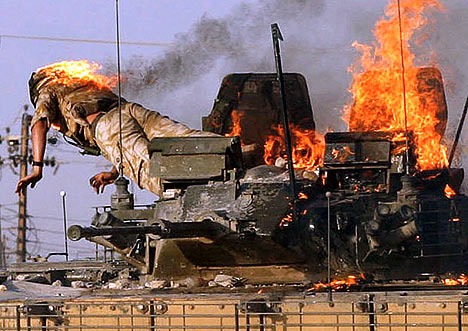British Legion accuses defence chiefs of hiding true scale of war casualties
by MATTHEW HICKLEY
Last updated at 23:22 16 March 2007Charity workers have accused the Defence Ministry of using data protection laws to "cover up" the true scale of casualties in Iraq and Afghanistan.
The Royal British Legion says it cannot offer support to thousands of injured soldiers because the MoD refuses to pass on their details.
The official excuse is that this is not allowed because of the strict rules on releasing personal data.

Iraq victim: A soldier leaps from a blazing tank
But Legion officials claim the secrecy really stems from Government efforts to conceal the terrible price being paid by our heroic servicemen and women.
Thousands of troops suffer physical and mental problems after fighting overseas but they are scattered across the country and difficult to count, and those diagnosed after quitting the military are ignored in official figures.
Mike Wright, Legion branch chairman for Penzance in Cornwall and himself a wounded veteran, said: "We have an enormous problem getting any information out of the MoD about who needs help. We're trying to find people but we run up against the same problem all the time."
Although the MoD claims it gives out information on charities to troops being medically discharged, Mr Wright said it was common for legion welfare officers to find veterans who had no idea that help was available, and have suffered in silence for months or years, feeling abandoned.
The legion raises £40million annually and helped 60,000 veterans last year, with everything from housing repairs to debt counselling and medical costs. Mr Wright said: "No Government likes to admit how many people are being injured. I think it's being covered up, and not telling us who these injured people are is a part of that."
Mr Wright, a 59-year-old former policeman, was himself one of those who was unaware of the help on offer.
He was wounded by a grenade when serving as a young soldier in Aden in the 1960s. When his damaged spine deteriorated neither he nor social advisers knew that the legion could help him - including financial help to buy his electric wheelchair.
Similar frustrations were voiced six months ago by senior officials from the Army Benevolent Fund, who accused the MoD of a "disgraceful" failure to take action to help them provide welfare assistance to former soldiers.
The MoD's response was to insist that its hands were tied by Data Protection laws.
Since then hundreds more soldiers have been injured in Iraq and Afghanistan, or developed mental health problems after leaving the armed forces.
Mr Wright's claims are the latest damaging blow for the Government over its treatment of the armed forces.
The MoD is already facing fierce criticism over the way badly wounded troops are cared for in NHS hospitals - particularly at Selly Oak in Birmingham where most casualties arrive - while many who have left the forces claim they have been "abandoned".
The Government has shut down the extensive network of dedicated military hospitals which once existed across the country and the last, at Haslar in Hampshire, will close at the end of this month.
Officials insist there were no longer enough military patients for medical staff to maintain their skills. But growing complaints over the treatment of injured troops on NHS wards have become a major embarrassment to the MoD.
Shaun Rusling, chairman of the National Gulf Veterans and Families Association, echoed the concerns over Whitehall secrecy.
He said: "They have two ongoing wars, and the Government doesn't want people to know how many are being injured. It's estimated there are 6,000 personnel medically unfit for duty, often living at home for months or years on end. They still show up in the Army's trained strength figures. I believe it's deliberate."
Mr Rusling said latest figures showed there were still 50 applicants a month for war pensions owing to medical problems caused by the first Gulf War 16 years ago.
The MoD bowed to pressure last year and began publishing partial casualty figures for Iraq and Afghanistan, although serving soldiers claim the true picture is far worse.
Sue Freeth, Director of Welfare at the Royal British Legion, said she believed the MoD was "nervous" over the true number of injured servicemen becoming known, but she acknowledged that it was trying to improve the way veterans were referred to charities.
The MoD insisted its hands remained tied by the 1998 Data Protection Act, which means any details from a soldier's medical file cannot be passed on without his permission - even to a charity trying to help.
Officials claimed there were now plans to try to tackle the logjam by offering all personnel leaving the forces the chance to sign a consent form to pass their details to key charities including the Legion.
